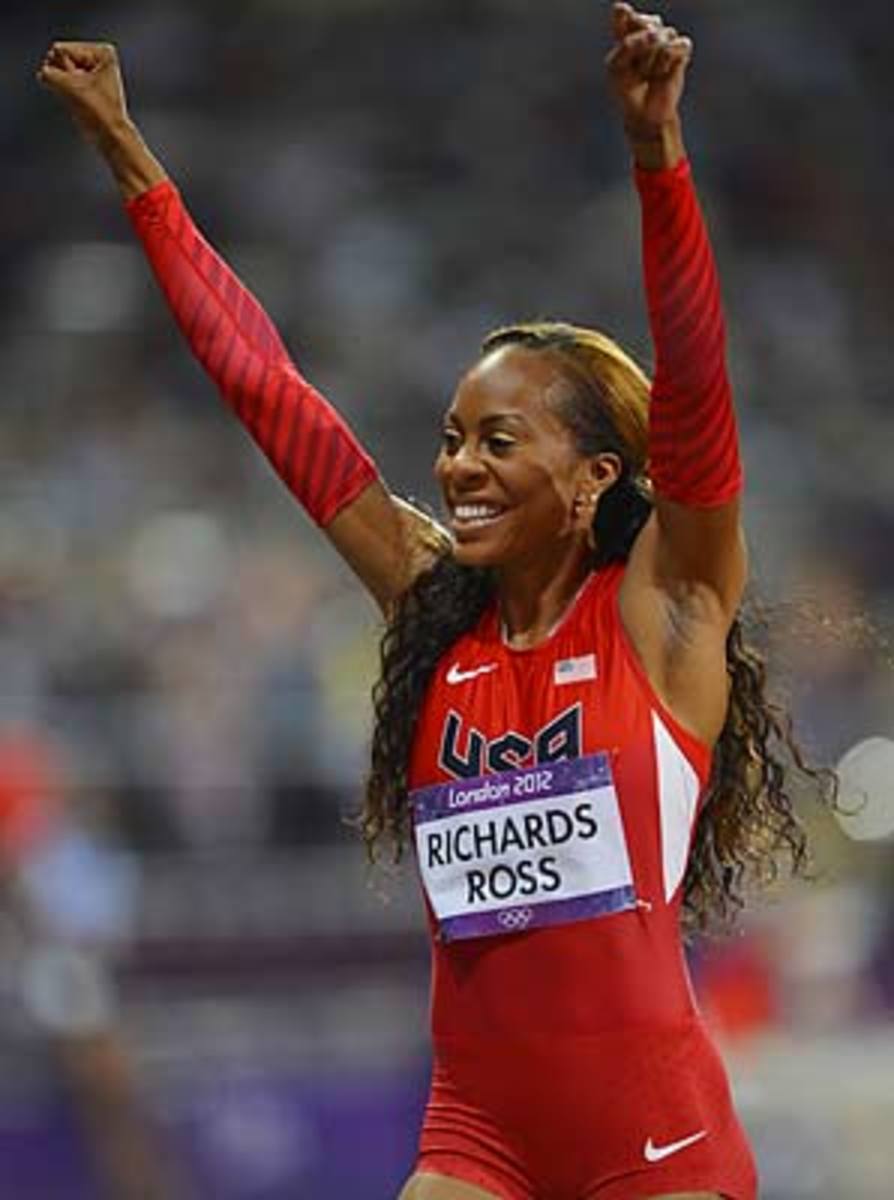Richards-Ross ends climb to glory with long-awaited gold in 400
LONDON -- Most Olympic athletes dream of the medal stand, of gold around their neck and their country's flag raised to the heavens. Sanya Richards-Ross did not. She didn't let herself get that far. She knows that may have been her downfall four years ago, that she got ahead of herself at the Olympics in Beijing, when she was favored to win the 400 meters and led going down the stretch yet faded to finish third. So Richards-Ross didn't dream about standing, she dreamed about striding, about coming down those last 50 meters and finishing what she started.
It turns out that if you concentrate on the work, the reward will come. It came to Richards-Ross, 27, as she completed the picture and capped her career with that long-awaited gold in the 400. The way she did it could not have been more gratifying, because it was her dream come true -- she had her usual strong start, was in good position on the backstretch, then took control in roughly the same place she lost it in Beijing, down the stretch, to finish in 49.55 seconds. She won because she was strongest at the end, edging Great Britain's Christine Ohuruogu by .15 seconds. DeeDee Trotter of the United States took the bronze in 49.72.
"In 2008 what I learned was that you don't win the race until you win the race," Richards-Ross said. "It took me some time to get past that, but this time when I stepped on that track I knew that I needed to cross that finish line first to call myself Olympic champion, and I had to dig really deep to do that."
In the four years of waiting to redeem herself at the Olympics, Richards-Ross' coach, Clyde Hart, continually counseled her, "Be patient, be patient," she says. He was talking about the big picture and the small one. He didn't want her to drive herself batty itching for the chance to set things right after Beijing, and he also wanted her to run patiently. She did that on Sunday, conserving some energy in the first 300 meters so that she had some reserves in the desperate dash to the finish.
"When I was coming down the homestretch I felt DeeDee, I didn't feel Christine," Richards-Ross said. "It wasn't until that last lean that I was almost 100 percent sure I had it, but you never want to celebrate until you see your name on top of that list."
She thought she would see it in Beijing, where it seemed that Olympic gold was the next logical step in her progression. After finishing sixth as a 19-year-old in the 2004 Games, Richards-Ross had steadily risen to be the top-ranked 400-meter runner in the world. She had set the American record in the event, won the silver medal at the 2005 world championships in Helsinki, and breezed to victory in the '08 Olympic trials. But on that day in Beijing, Ohuruogo and Jamaica's Shericka Williams ran her down at the end.
There may not be a better talker in all of the Olympics than Richards-Ross. She is gracious and upbeat and she speaks in full, neat paragraphs. If she hadn't been so fast, she could have made it as a TV anchorwoman or talk show host. She has always been willing to talk about the disappointment of Beijing, but for all her words, she has never really been able to fully explain it. It wasn't as simple as running out of gas, though that may have been part of it. Among the many benefits of winning the gold is that she will no longer be pressed to provide an explanation.
It's easier to explain how she pulled herself back together after the heartbreak. Heart was part of it, as was her father, Archie Richards, and perhaps most importantly, her husband, NFL cornerback Aaron Ross. "He has been such an inspiration for me, my biggest confindante and motivater," Richards-Ross said. Ross, who won a pair of Super Bowls with the New York Giants, signed with the Jacksonville Jaguars during the offseason, and the Jags gave him time off from training camp to come to London and watch his wife chase gold. Richards-Ross' voice quivered as she described seeing him just after she won, in the post-race press conference she looked over at him in the back of the room as she referred to Jacksonville as "the place he ought to be right now."
But Ross wouldn't have missed it. "I know she drops everything when I'm in the playoffs or the Super Bowl," he said. "We support each other. There was no way I was going to miss this."
It wasn't just the memory of the Beijing bronze that Richards-Ross had to overcome. In 2007 she was diagnosed with Behcet's disease, a rare autoimmune disease that causes painful sores in the mouth and on other parts of the body. She took to wearing sleeves on her arms to cover the lesions. At times, both before and after Beijing, she had to reduce her training because of the symptoms. But a new doctor last year told her that she had been misdiagnosed and actually had a skin disease that was much more treatable than Behcet's and required far less potent drugs. For the last year, she has been healthier in body and mind than she has been in years, which set her up well for London.
And so it all came together on Sunday night. Richards-Ross had health, she had love, and she had determination. It was no wonder that when she came into the mixed zone to talk to the media after the race, her first comment was "Hello everybody," followed by a scream of joy. The timer will say that she finished her work in a shade under 50 seconds. But Richards-Ross knows that it took her four years.






